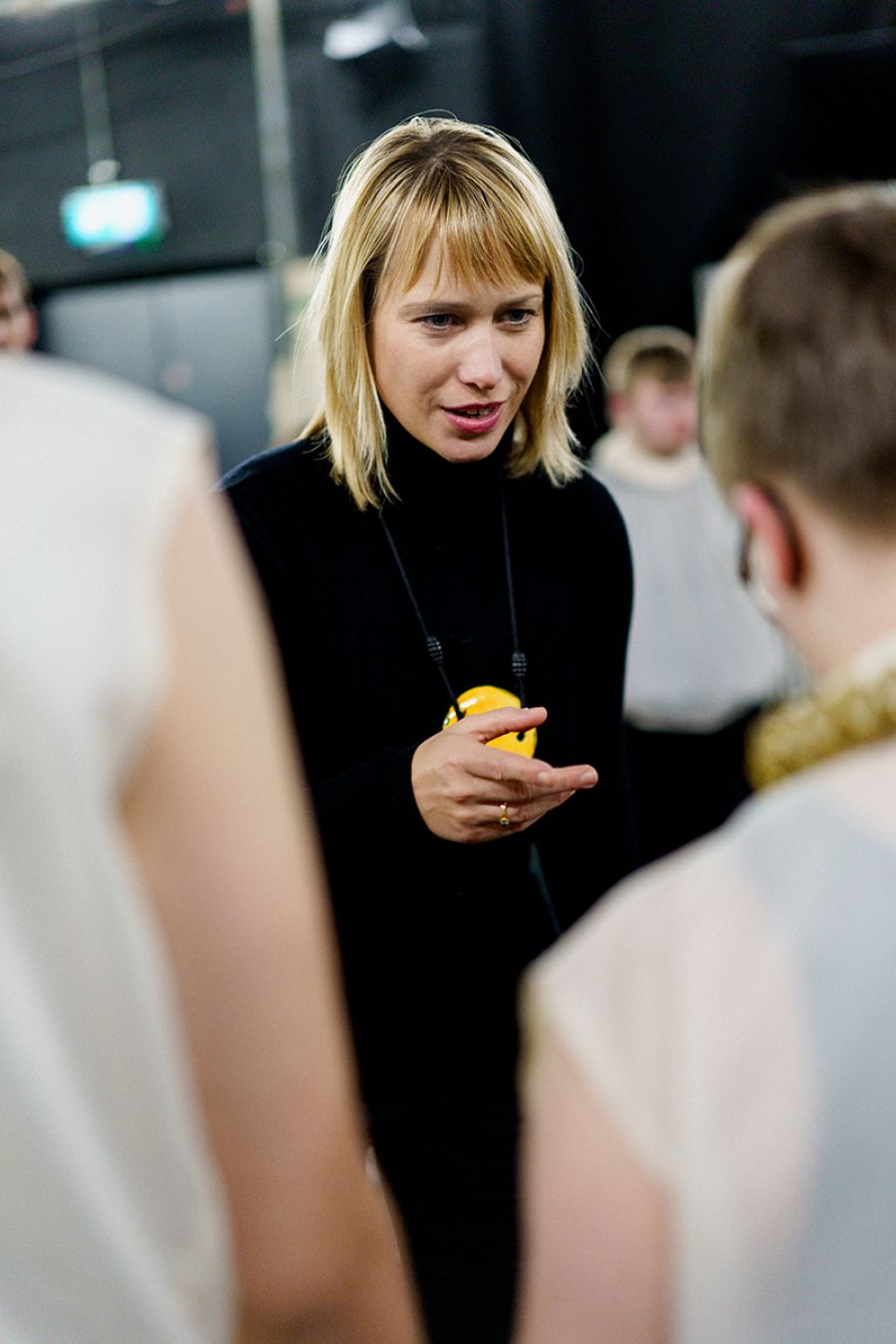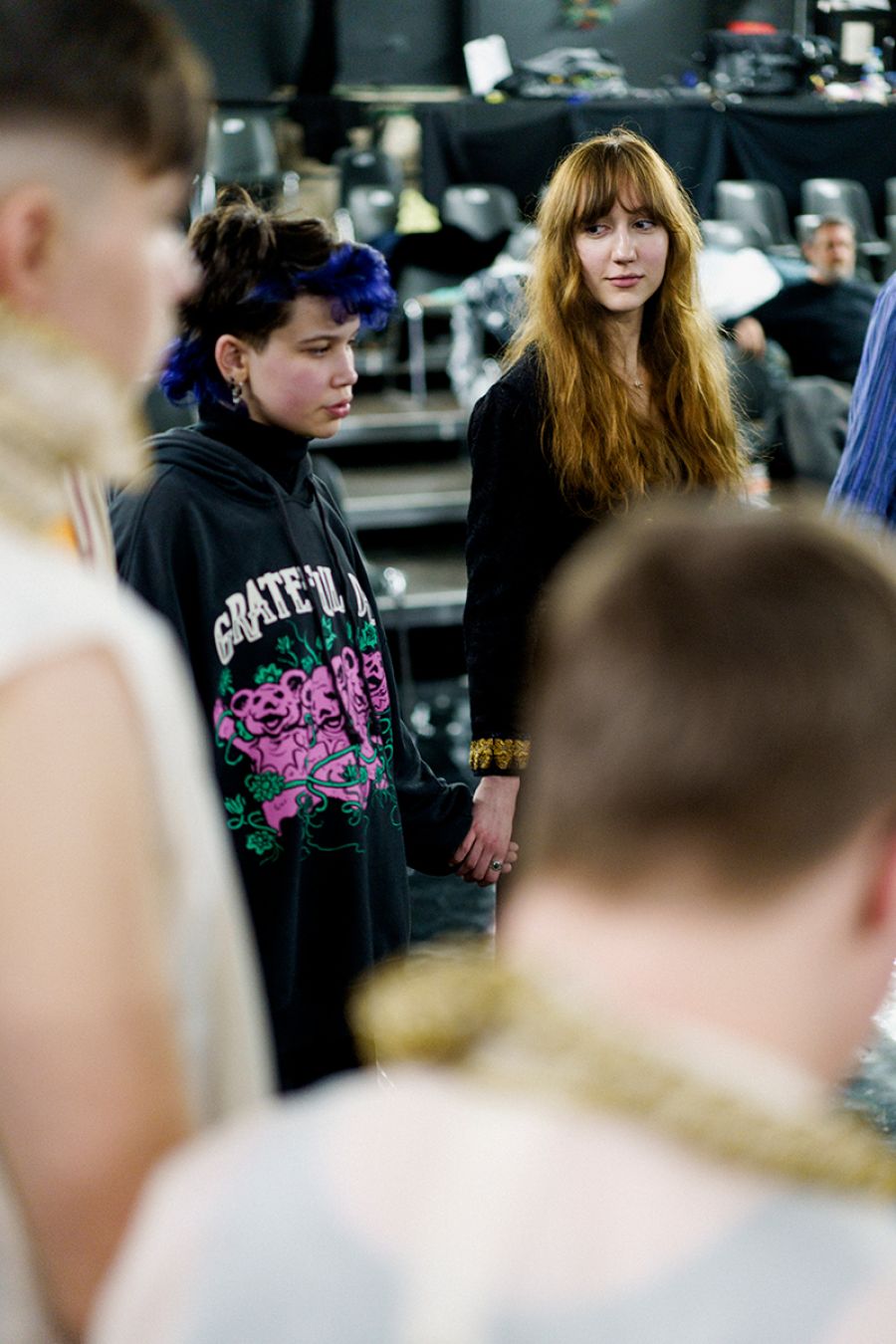Junge Welten - Deutsche Oper Berlin
What moves me
Youth worlds
For its »Stabat Mater« project Young Opera has teamed up with Theater RambaZamba. The result is a performance that expands on the original piece by Arvo Pärt. Here a peek at a rehearsal
It’s a short step from ecstasy to meditation. A few moments ago the youngsters were dancing wildly around the stage to »Die Young« by Kesha, warming themselves up to the carpe diem beat of »Let’s make the most of the night like we’re gonna die young«. Now they’re arranging candles in jam jars and gathering for the first scene. The lights go out and a procession slowly sets off, a chorus humming in the gloom. Simultaneously, one of the actors, Anastasiia, delivers a text in Ukrainian. Another, Louise, quotes from Bertolt Brecht’s poem »Children’s Requests«: »Mothers shall not weep. No one shall kill another.«
On the stage of Theater RambaZamba in Berlin’s Prenzlauer Berg district a collaboration is currently underway between the inclusive drama institution and the youth section of the Deutsche Oper Berlin. It has assembled a group of approx. 30 actors, young people with or without disabilities from Berlin and Ukraine. The project revolves around »Stabat Mater«, a work by the Estonian composer Arvo Pärt that sets to music a mediaeval poem about Maria’s grief over her crucified son. »Stabat Mater dolorosa« - »The sorrowful mother stood«.
She spent ages searching for a piece of music that everyone could access or relate to in some way, says director Kirsten Burger, who has headed the youth section of RambaZamba since 2022. »I can definitely say I’ve never encountered a group that’s been so interested in religion.« The youngsters from Ukraine are mostly Orthodox and on a spiritual quest of sorts. »At the same time many of them have been traumatised by war and have lost faith in the prospect of peace.« Themes such as war, violence and traumatic experiences will likewise be aired in the project. Burger aims to place »Stabat Mater« - which will be performed by professional singers and string musicians of the Deutsche Oper Berlin – within a framework comprising songs, electronic compositions and texts written by the actors themselves.
A participatory project of this kind demands a lot of openness and flexibility from all those involved, not least from costume designers Marlene van Dieken and Carlotta Dering – who have to respond to ever-changing scene set-ups – and the music director Misha Cvijovic, who mounted »LAUT!« with Young Opera in 2020 but has never worked with variously abled people. »I twigged pretty soon that I could junk all my expectations,« she says; working with youngsters with disabilities, it simply wasn’t possible to rehearse a piece for multiple performances. Instead, a series of improvisations resulted in some stimulating soundscapes. »I have to surrender control and just trust in the connections that spring from the process,« says Cvijovic. »For me too, as a composer, it’s an adventure.«

The project is a convergence point for many different perspectives and personal biographies. Nuria likes the singing and dancing most – and the opening scene. »When I go on stage holding the candle, it’s almost like I’m an ultra-religious person.« Niklas was involved in Kirsten Burger’s previous RambaZamba production, »Schwärmen«, a piece about climate change held in the Humboldt Forum. »The most important thing when you’re doing theatre is to concentrate,« he says, »and not just dash around doing stuff.« Valeriia grew up in the Crimea. Her family is Jewish and her grandmother was born in Poland, so she has mixed feelings about »hearing the Germans talking about the war in Ukraine«. Anastasiia mentions a question that came up during rehearsals: »What dream do you have?« Hers was »that every country live in a state of peace« and it was thought to be utterly naïve.

The encounter with Anastasiia forces a person to reflect on his or her own false expectations and projections. What does she think of Pärt’s »Stabat Mater«? The questions perplexes her and is repeated slowly and clearly. Pärt? The composer? Anastasiia interjects: »I know Arvo Pärt. I played in a classical orchestra for eight years in Ukraine«. Violin, piano, domra (a curve-backed lute). »How am I meant to describe a masterpiece like this in a few words?« She adds that Pärt switches at the drop of a hat »from sun to rain. And you can’t encapsulate all that by saying: Ah, what a nice legato«.
Surprises come thick and fast this afternoon. Csilla and Louise are acting and playing music in »Stabat Mater«. They have their own band called »Kalte Knie« and according to Louise their material is »often described as punk rock noisy alternative«, although none of the standard labels really fits. Csilla tries to pin down the chaotic, creative process of putting together a collaborative work that »doesn’t follow any rules, because young disabled people have their own special sense of what they want to end up with.« Music is »a good opportunity to build bridges.« Louise says she’s brought Brecht’s »Children’s Requests« to present as a song at the rehearsal. She’d had the idea »because my grandpa set it to music«. Csilla provides a spare elaboration: »Her grandfather was Paul Dessau.«





